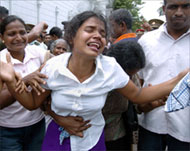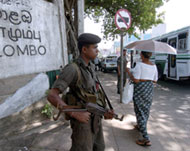Sri Lanka fighting claims more lives
More civilians have been killed in clashes between Tamil Tiger rebels (LTTE) and the Sri Lankan army bringing the death toll to 28 over the last two days, miltary officials have said.

Five more civilians and two soldiers were killed on Friday in artillery fire in the northeastern town of Muttur.
While shelling continued, thousands of Muslims have been fleeing the city of Muttur, south of the port city of Trincomalee, a Tamil stronghold, since fighting broke out last Wednesday.
“We just got information that they have started moving. According to information in Mutur, everyone will leave – that’s 6,000-7,000 families,” said Yvonne Dunton, head of the Trincomalee office of the International Committee of the Red Cross (ICRC).
Most people have been heading to Kantalai, about 50km (30 miles) away by road as the regular ferries, which could have taken them to the nearby Trincomalee, had been halted, officials said.
|
“We have not been able to achieve the humanitarian corridor we wanted to establish for us to move freely and care for the affected people in Muttur” Sukumar Rockwood, ICRC spokesman |
Relief workers said families were using any transport they could find to get out of the mainly-Muslim northeastern town of Muttur, which on Wednesday became the latest flashpoint in a many-fronted battle in which at least 165 people have died.
“We left everything behind, our wealth, our belongings. We have to be somewhere safe,” said 24-year-old shop owner S.M. Ramees, arriving with thousands of fellow displaced at the town of Palathoppur south of Muttur.
Corridor to safety
The ICRC has been concentrating its efforts on evacuating people from Muttur and wanted security guarantees from the government and the rebels to allow it to reach civilians in the city, but could not get them, ICRC spokesman Sukumar Rockwood said.
“We have not been able to achieve the humanitarian corridor we wanted to establish for us to move freely and care for the affected people in Muttur,” Rockwood told AFP.
“We do not have access to Muttur, but we have already sent an ambulance, three jeeps and three buses to Kantalai for the use of these people if they need to travel beyond Kantalai,” he said.
 |
|
Many Sri Lankans have lost family |
As civilians fled, the military was pouring more troops into the area, military officials said.
Talks of a truce
As the two sides traded mortar bomb fire in Muttur, a Norwegian peace envoy opened talks in the capital Colombo with Sri Lankan officials.
Jon Hanssen-Bauer, Norway’s peace envoy, went into a meeting with Ratnasiri Wickremanayake, the Sri Lankan prime minister, government officials said. Details of the talks were not immediately available.
Hanssen-Bauer was due to travel to the rebel-held town of Kilinochchi on Saturday and spend a few days talking with the guerrilla leadership about salvaging what is left of the February 2002 truce.
“The envoy will spend the weekend in Kilinochchi talking to the LTTE leadership,” said LTTE spokesman Velayadun Dayani.
“He will talk about the peace process and the war-like situation,” Dayani said.
War returns
“It has now come to a situation in which the only interaction they can have is on the battlefield” Paikiasothy Saravanamuttu, of the Centre for Policy Alternatives |
The Tigers gave monitors from the EU a September 1 deadline to quit the island after the bloc listed them as a terrorist organisation alongside the likes of al Qaeda, reducing the 54-member mission to just 20 people.
The Tigers are furious at President Mahinda Rajapakse’s refusal to recognise their de facto state in the north and east as a separate homeland for minority Tamils, and ultimately want to recapture the eastern port of Trincomalee and northern Jaffna peninsula, which is now occupied by around 40,000 troops.
Analysts fear that the country is heading for all out civil war.
“I can’t see anyone getting back to peace talks until a clear change in the balance of power on the ground has been accepted, and likewise with the cease-fire,” said Paikiasothy Saravanamuttu of the Centre for Policy Alternatives, a private think-tank.
“It has now come to a situation in which the only interaction they can have is on the battlefield,” he added.
“I don’t know what the hell Hanssen-Bauer is going to talk about,” Saravanamuttu said.
 |
|
Security has been stepped up around |
The government and the LTTE separately say they remain committed to a 2002 ceasefire, but truce monitors, diplomats and even some military officials say a war that has killed more than 65,000 since 1983 has resumed to a greater or lesser degree.
Each side accuses the other of pulling out of the truce, and is keen to avoid blame for the collapse of the island’s protracted peace process.
“Now it has gone beyond the realm of a low intensity war,” said Iqbal Athas, an analyst for Jane’s Defence Weekly. “In my view, Eelam War IV has already started.”